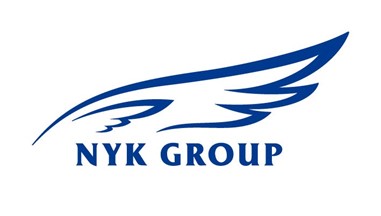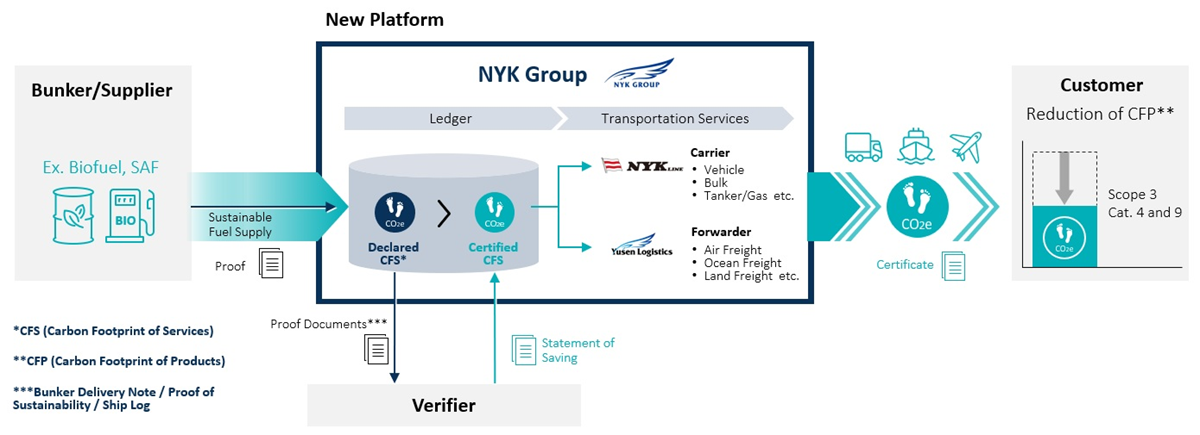Dec. 19, 2024
NYK and Yusen Logistics to Introduce Platform to Manage GHG-Emission Reductions
Jointly Supporting Customers' Scope 3 Reductions
Nippon Yusen Kabushiki Kaisha
Yusen Logistics Co., Ltd.

Nippon Yusen Kabushiki Kaisha (NYK) and Yusen Logistics Co., Ltd. (YL) have introduced a digital platform for managing greenhouse gas (GHG) emission reductions*. The platform is provided by 123Carbon B.V. (123Carbon), a Netherlands-based startup working on decarbonizing the logistics sector. NYK and YL, a comprehensive logistics group, will use the platform to support the reduction of Scope 3** GHG-emissions by allocating to platform customers the GHG-emission reductions achieved through the use of alternative fuels in our ocean, air, and land transport services and issuing certificates confirming those reductions.
Process for Managing and Allocating GHG-Emission Reductions
- NYK
Generates and manages GHG-emission reductions through the use of biofuels in its bulk shipping business, recognizes the environmental value of these reductions, then allocates them to YL and issues a certificate of confirmation. The first allocation will be completed on the platform after verification by a third-party certification organization.
- YL
Procures GHG-emission reductions generated by ocean shipping companies like NYK and its airline partners*** and provides accompanying certificates. Additionally, for land transport, YL will utilize sustainable fuels derived from waste cooking oil and other renewable materials to power its own trucks in some countries and areas, actively creating and managing GHG-emission reductions as a transport operator. A one-stop service on the platform will be officially launched by YL shortly.
Key Features of the Platform
- Customers can monitor GHG-emission reduction methods and the alternative fuels used to generate the reductions.
- The management and allocation of GHG-emission reductions are secured using blockchain technology to prevent data tampering.
- The entire process, from calculating GHG-emission reductions to allocating, is verified by a third-party certification organization to ensure the platform's reliability and transparency.

Diagram of GHG-emission-reduction management and allocation
Background of Platform Introduction
Achieving a decarbonized society is a global challenge that must be tackled head-on. Companies require close collaboration with customers, partners, and other stakeholders to reduce Scope 3 GHG-emissions from transportation. By leveraging our expertise as a comprehensive global logistics group, we will contribute to reducing GHG-emissions in customers' supply chains by launching a one-stop service that enables appropriate allocation of GHG-emission reductions created by each transport mode.
Comment from Jeroen van Heiningen, Managing Director, 123Carbon
“We welcome NYK and YL as new users to our advanced platform. They are not only using our registry services, but have also adopted our branded platform, allowing them to directly involve their customers in their low carbon activities. We are looking forward to executing this trial and collaborating with NYK and YL on this exciting topic."
NYK supplies biofuel to car carriers, bulk carriers, and crude oil tankers. In November 2023, the company released the “NYK Group Decarbonization Story,” which sets a GHG-reduction target to achieve net-zero emissions by 2050.
YL is working toward its medium-term target of reducing GHG-emissions by 45% by 2030, focusing primarily on Scope 1 and 2 emissions to align with its goal of achieving decarbonization by 2050.
The NYK Group will continue to take a long-term perspective in its efforts and promote initiatives that contribute to reducing GHG-emissions, working with its customers to realize a decarbonized society.
* Greenhouse gas (GHG) emission reductions
GHG-emissions reduced by using alternative fuels compared to traditional fossil fuels.
** Scope 3
Indirect GHG-emissions associated with an entire corporate supply chain, including emissions that occur across the supply chain and outside the organization's direct control, such as raw-material sourcing, product transport, product use, and disposal.
*** Airline partners
Airlines reduce GHG-emissions by using sustainable aviation fuel (SAF) produced from sustainable resources such as waste oil and plants. SAF produces fewer GHG-emissions compared to conventional jet fuel.
Contact Information
Media Relations Team, Corporate Communication Group, NYK
Attn: Mori
Tel: +81-3-3284-5190
Email: NYKJP.ML.MEDIA@nykgroup.com
Public Relations Sec., General Affairs Department, Japan Region Human Resources & General Affairs Division, YL
Attn: Saito
Tel: +81-80-8008-0484
Email: yljpprd@jp.yusen-logistics.com
The news on this website is as of the date announced and may change without notice.